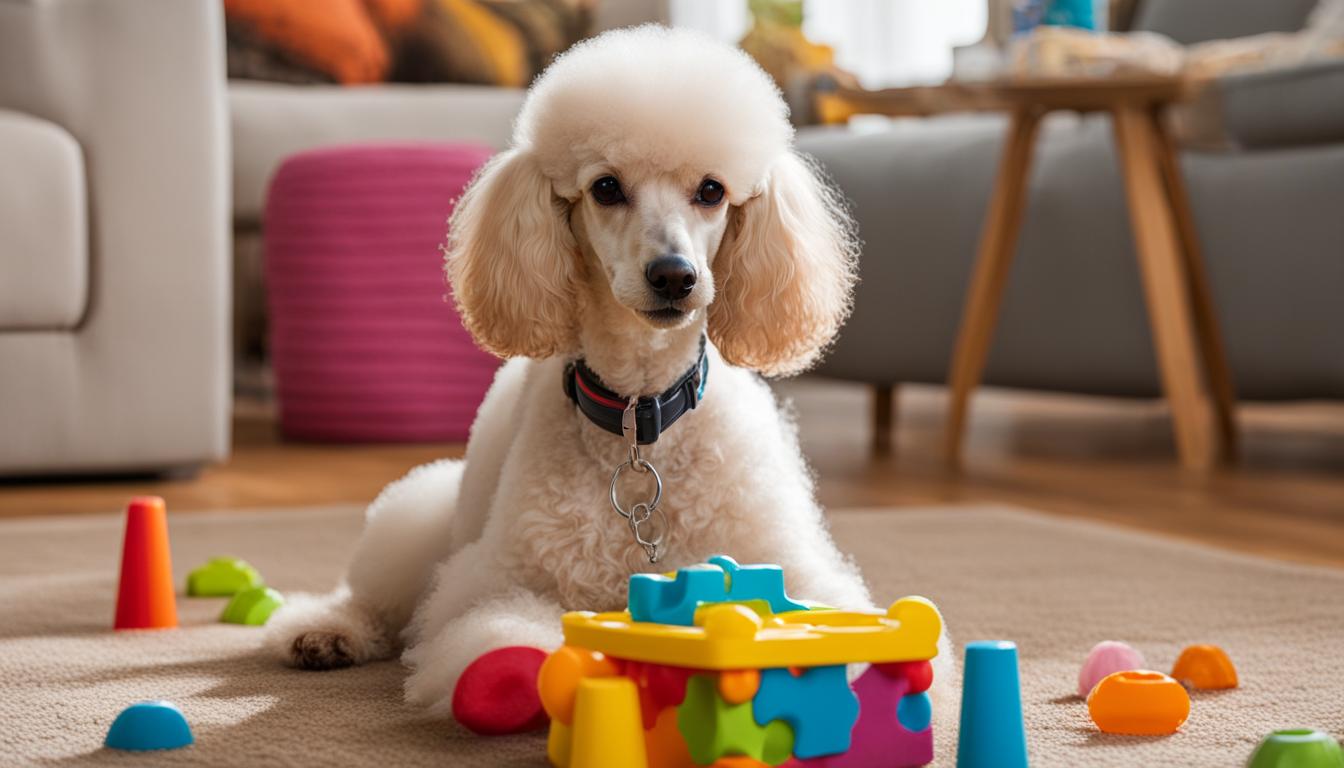Dog owners often face the problem of their pets barking at delivery personnel. This can cause concern and disrupt the environment. It might be because dogs alert their owners to potential threats or because they are bored and have too much energy.
To tackle barking issues, it’s important to understand why dogs bark. Then, we can use effective dog barking training methods. This article aims to give dog owners useful tips and strategies. We want to help dogs feel more at ease and calm when delivery personnel arrive, reducing stress and anxiety for everyone involved.
Why Dogs React to Delivery Personnel
Dogs react to delivery people because of their protective nature. They want to keep their territory and loved ones safe.
Not being socialized can make dogs bark at strangers. Getting them socialized early helps a lot.
Several things make dogs react to delivery people:
- Territorial protection
- Lack of socialization
- Fear or anxiety from the delivery person’s look or tools
Knowing why dogs react helps owners train them better. It’s the first step to making dogs calm and friendly with delivery people.

With the right training and socialization, dogs can learn to be calm around delivery people. This makes the interaction safer and less stressful for everyone.
Assessing Your Dog’s Barking Behavior
To tackle the issue of your dog barking at delivery personnel, it’s crucial to assess the underlying reasons. Dogs bark for various reasons, including alerting, boredom, or anxiety. Understanding the cause of your dog’s barking is essential to address the issue effectively.
Start by observing your dog’s behavior when they bark at delivery personnel. Are they barking due to excitement, fear, or protective instincts? Identifying the trigger will help you tailor your training approach. For professional guidance on addressing barking issues, consider visiting barkingbatty.com/services/ for expert advice on dog behavior assessment.

By understanding the root cause of your dog’s barking, you can develop a more effective training plan. This assessment is a critical step in helping your dog become more calm and composed when faced with delivery personnel.
Essential Preparation Before Training Begins
Getting ready for dog training is key. Make sure your dog gets enough physical and mental play. A tired dog is happier and less likely to bark from boredom or too much energy.
Key Preparation Steps:
- Provide regular exercise to burn off excess energy.
- Engage your dog in mentally stimulating activities.
- Ensure your dog has a comfortable and safe environment.
By following these steps, you can cut down on your dog’s barking. This prep work is important for effective training.

Specific Training For Dogs That Bark At Delivery Personnel
Positive reinforcement is a great way to train dogs that bark at delivery people to stay calm. This method rewards good behavior instead of punishing bad ones.
Treat-Based Rewards
Using treats to train your dog is very effective. Give your dog a treat when they stay calm around delivery people. This teaches them that being calm is good.
Tips for Using Treat-Based Rewards:
- Choose high-value treats that your dog loves.
- Reward your dog the moment they exhibit calm behavior.
- Gradually phase out treats as your dog becomes more reliable.
Verbal Praise and Physical Affection
Verbal praise and physical affection are also important. When your dog stays calm, praise them and show affection. This helps them understand what you want.
| Reward Type | Effectiveness | Tips for Use |
|---|---|---|
| Treat-Based Rewards | High | Use high-value treats, reward immediately, and phase out gradually. |
| Verbal Praise | Medium to High | Use a happy, upbeat tone, and be consistent. |
| Physical Affection | Medium to High | Use gentle, calm gestures, and avoid overexciting your dog. |

By using these positive methods, you can train your dog to stop barking at delivery people. Remember, being consistent and patient is crucial for success.
Step-by-Step Training Protocol
Training your dog to stop barking at delivery people takes time and patience. It’s important to expose your dog to the things that make them bark in a controlled way. This helps them get used to it slowly.
To begin, find out what makes your dog bark at delivery people. It might be the sound of the doorbell or seeing the delivery person. It could be both.
After you know what triggers the barking, you can start training. Here’s how:
- Start by showing your dog the trigger at a low level, so they don’t bark.
- Give them a treat for staying calm.
- Slowly make the trigger stronger, but keep giving treats for calm behavior.
- For more tips on stopping barking, check out https://barkingbatty.com/how-to-stop-your-dog-from-barking/.
Being consistent is key in this training. Make sure everyone in your family uses the same methods and rewards. This helps your dog not get confused.
By sticking to this training plan, you can help your dog feel more at ease with delivery people. This should reduce the barking over time.
Essential Commands for Delivery Situations
To make deliveries smooth, teach your dog key obedience commands. These commands help lower your dog’s stress and reactions during deliveries.
Key Commands for Delivery Situations
- Sit: Encourages your dog to stay seated, preventing them from jumping up at delivery people.
- Stay: Teaches your dog to stay put, even when they hear the doorbell or a knock.
- Quiet: Helps your dog stop barking when told, making deliveries less stressful.
| Command | Purpose | Benefit During Deliveries |
|---|---|---|
| Sit | Remain seated | Reduces jumping up |
| Stay | Remain in place | Prevents rushing to the door |
| Quiet | Stop barking | Reduces stress and noise |
By teaching these commands, you can greatly improve your dog’s behavior during deliveries. This makes the environment more peaceful for both your dog and the delivery team.
Training Approaches for Different Dog Personalities
Effective dog training means knowing and meeting each dog’s unique personality. Dogs of different breeds and temperaments need different training methods.
Tailoring Training to Dog Personalities
High-energy breeds like Border Collies need active and engaging training. They thrive on physical and mental challenges. On the other hand, laid-back breeds like Bulldogs do better with shorter, calmer training sessions.
| Dog Personality | Training Approach | Key Characteristics |
|---|---|---|
| High-Energy Breeds | Vigorous Training | Physical activity, mental stimulation |
| Laid-Back Breeds | Relaxed Training | Short sessions, gentle commands |
| Fearful Dogs | Gentle, Gradual Training | Building trust, patience |
Knowing your dog’s personality helps you choose the right training method. This makes training more effective and fun for both you and your dog.
Tools and Aids to Support Your Training
Effective dog training needs more than just commands. It requires the right dog training tools. The right aids can make training easier for you and your dog.
Using interactive toys and puzzle feeders can help a lot. These tools keep your dog busy and reduce barking. They also keep your dog’s mind sharp, which helps them not bark at delivery people.
- Interactive toys that dispense treats
- Puzzle feeders that challenge your dog to figure out how to get their meal
- Durable chew toys that keep your dog occupied
These barking solutions are great for training and everyday life. They help manage your dog’s behavior. Adding these tools to your training plan makes your dog’s environment calmer and more disciplined.
Remember, the secret to good dog training is being consistent, patient, and using the right tools. With these, you can tackle barking problems related to delivery people effectively.
Environmental Management Strategies
Changing your dog’s environment can help them react less to things like delivery people. By managing their surroundings, you can lessen the things that make them bark.
One good way is to block your dog’s view of the street. You can do this by closing curtains or blinds, or using window films. Reducing what they see can really cut down on barking.
Another method is to use white noise or calming music. This can cover up the sounds that make your dog bark, like delivery trucks or footsteps. It helps make a calmer space for your dog.
| Strategy | Description | Benefit |
|---|---|---|
| Blocking View | Close curtains or use window films | Reduces visual triggers |
| White Noise | Use white noise machines or calming music | Masks external sounds |
| Rearranging Space | Move your dog’s area away from windows | Decreases exposure to triggers |
By using these strategies, you can make a better place for training your dog. This can help lower barking when delivery people come.
Troubleshooting Common Training Challenges
Overcoming dog training challenges needs patience, consistency, and knowing the root issues. Dog owners face many hurdles when teaching their dogs not to bark at delivery people.
One big challenge is inconsistent reinforcement. If some family members let the dog bark while others don’t, it confuses the dog. To fix this, setting clear rules and making sure everyone agrees is key.
Another issue is lack of patience. Training a dog takes time, and expecting quick results can be frustrating. Remember, slow progress means you’re on the right track.
| Common Challenge | Solution |
|---|---|
| Inconsistent Reinforcement | Establish consistent rules and ensure all household members follow them. |
| Lack of Patience | Understand that training is a gradual process and celebrate small victories. |
| Not Addressing Underlying Causes | Identify the root cause of barking and address it through targeted training. |
By tackling these common issues, dog owners can better their training and cut down on barking at delivery people.
Conclusion: Maintaining Long-Term Success
Being consistent and always training is key to keeping your dog calm around delivery people. This way, you can have a quieter and less stressful time when deliveries come.
A study showed that dogs trained with rewards have lower stress and are happier https://pmc.ncbi.nlm.nih.gov/articles/PMC7743949/. Using rewards to train your dog can make them feel safer and calmer when delivery people arrive.
To keep your training working, stay committed and adjust as needed. With patience and practice, your dog will learn to stop barking at delivery people. This will make your home a happier and less stressful place for both you and your dog.






